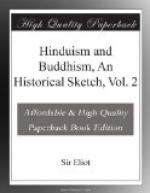The characteristic doctrine of sectarian Hinduism is bhakti, faith or devotion. The older word sraddha, which is found in the Vedas, is less emotional for it means simply belief in the existence of a deity, whereas bhakti can often be rendered by love. It is passionate, self-oblivious devotion to a deity who in return (though many would say there is no bartering) bestows his grace (prasada or anugraha). St. Augustine in defining faith says: “Quid est credere in Deum? credendo amare, credendo diligere, credendo in eum ire, et ejus membris incorporari."[425] This is an excellent paraphrase of bhakti and the words have an oriental ring which is not quite that of the New Testament. Though the doctrine of bhakti marks the beginning of a new epoch in Hinduism it is not necessary to regard it as an importation or due to Christianity. About the time of the Christian era there was felt in many countries a craving for a gentler and more emotional worship and though the history of Bhaktism is obscure, Indian literature shows plainly how it may be a development of native ideas. Its first great text-book is the Bhagavad-gita, but it is also mentioned in the last verse of the Svetasvatara Upanishad and Panini appears to allude to bhakti felt for[426] Vasudeva. The Katha Upanishad[427] contains the following passage:
“That Atman cannot be gained by the Veda, nor by understanding nor by much learning. He whom the Atman chooses, by him the Atman can be gained. The Atman chooses him as his own.” Here we have not the idea of faith or love, but we have the negative statement that the Atman is not won by knowledge and the positive statement that this Atman chooses his own. In the Rig Veda[428] there is a poem put into the mouth of Vac or speech, containing such sentiments as “I give wealth to him who gives sacrifice.... I am that through which one eats, breathes, sees, and hears.... Him that I love I make strong, to be a priest, a seer, a sage.” This reads like an ancient preliminary study for the Bhagavad-gita. Like Krishna the deity claims to be in all and, like him, to reward her votaries. It is true that the “Come unto me” is not distinctly expressed, but it is surely struggling for expression.[429] Again, in the Kaushitaki Upanishad (III. 1 and 2) Indra says to Pratardana, who had asked him for a boon, “Know me only: that is, what I deem most beneficial to man, that he should know me.... He who meditates on me as life and immortality gains his full life in this world and in heaven immortality.” Here the relation of the devotee to the deity is purely intellectual not emotional, but the idea that intellectual devotion directed to a particular deity will be rewarded is clearly present. In the Rig Veda this same Indra is called a deliverer and advocate; a friend, a brother and a father; even a father and mother in one. Here the worshipper does not talk of bhakti because he does not analyze his feelings, but clearly these phrases are inspired by affectionate devotion.




